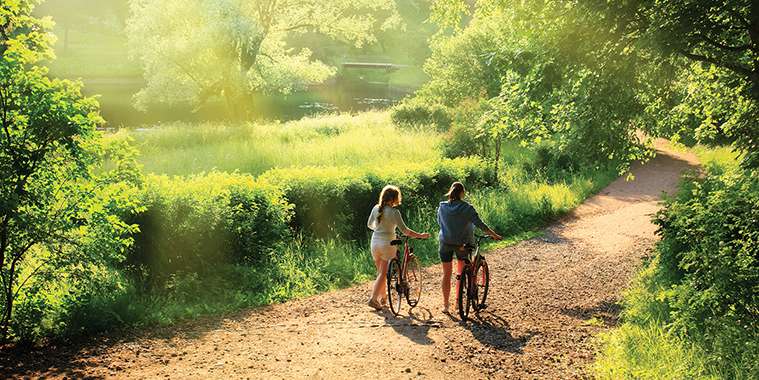The birds, the bees, the peace and quiet. Nothing quite compares to living outside the city. Whether it’s a waterfront oasis in cottage country, or a hobby farm where you can realize your dream of raising chickens, many people who consider a change of lifestyle do so by opting to move from the city to the country.
While the basics of moving remain intact, there are elements specific to country living you should keep in mind if you’re tempted to go this route. Let’s look at some of the fundamentals for people who’ve never experienced a city-to-country move.
1. Wells and water systems
Rural water sources include springs, wells, rivers, lakes, rainwater and trucking water, though most water for rural homes comes from wells or springs.
“Though some shallow wells have excellent recovery rates, you’re preferably going to want a well that’s deep drilled,” says Duncan McDougald, a REALTOR® with RE/MAX Executives Realty in Whitemouth, Manitoba.
One of the key ways rural water differs from urban water is the treatment process. It’s more challenging to treat rural water as contamination is likely from many possibilities that simply don’t exist in the city.
“Water must be treated to the government standard of 0 ppm, but even so, total coliforms, a large group of bacterias often caused by normal soil bacterias, are extremely common,” McDougald says.
There are many options for home water treatment systems if the water isn’t 100%.
“A simple UV light water treatment system can usually be found at the local hardware store and installed for under $1,000 — just don’t push the expiry limit on changing the UV bulb,” McDougald explains.
2. Municipal garbage collection
A lot of Canada’s rural regions have limited municipal waste, recycling, and disposal services, posing various challenges and differences when compared to the services provided in urban settings.
“If you live outside of a town, garbage collection is often not provided by the municipality. Private contractors often jump in to fill this void, but at a cost,” explains McDougald. “It’s a good thing to learn how close you are to your municipal landfill or recycling facility, especially if you plan on taking waste there yourself. Most municipalities allow you to bring your normal household waste and recycling without any extra charges, but if it’s demolition waste, do expect to have to pay a fee.”
Though in many municipalities there’s no garbage and recycling fee, there are some communities that apply fees when disposal exceeds the stipulated limit.
3. Septic systems
Consisting of a tank, a network of pipes, billions of organisms that process waste, and a drain field, septic systems are wastewater treatment units that perform the role municipal sewers do in cities. They require upkeep and may well involve cooperation with a neighbour.
McDougald advises you “always be sure to find out where the septic field actually is.” “Installers often look after all permits and tests, but if you’re buying a home with a pre-existing septic field, it’s a good idea to walk on it,” he suggests. “If it feels spongy or wet, you can expect troubles in the very near future. Septic fields can be quite costly to build these days, so get quotes from multiple installers when working on your budget.”
4. Telecommunications and connections
Living in rural areas can mean being far less connected to high-speed, reliable internet than when living in the city. Even though you’re choosing to live further from the hustle and bustle, being connected remains a huge part of daily life for most people.
“You’ll definitely want to find out what options are available at the home you’re looking to purchase,” explains McDougald. “Some companies have put options into the more heavily populated areas along with LTE options from the phone companies and private businesses who have made major investments in the market.”
Consistent cell service is also another necessity to consider, as it’s important to ensure you have coverage in the place you’ll need it the most. Services like Starlink, which offers high-speed, low-latency internet service, are becoming more available, though not every area has access to the technology.
5. Public transit and ride shares
McDougald notes though most people moving to a rural setting aren’t looking for public transport, it’s worth noting that it’s usually near non-existent.
Though it may not be as high a priority as it can be when living in the city or when working remotely, it should be kept in mind that the transport and infrastructure in country environments will often be far behind that of cities. However, far from the hustle and bustle of the city, residents in rural communities have the advantage of traffic and commotion-free streets to enjoy a pleasant walk, run or cycle. More thought might have to be given to the availability of ride-sharing services and whether school buses make their way towards your area.
6. Zoning
Zoning in rural municipalities refers to the protection of agricultural lands, such as farmland, from urban or industrial development. This means if you plan to move to the country, and want to have a few farm animals, check with the municipality about zoning for the property, making it clear what you plan on doing. And be aware your neighbours in the country may include four-legged friends — ones that are a bit more noticeable than the cat that currently lives in the condo above you.
“If you’re concerned about livestock operations, I strongly encourage you to establish a good idea of who your neighbours would be,” says McDougald. “Farmers are a vital part of rural communities, so if you’re averse to farm smells or machinery noise, you may want to be extra selective where you’re looking for a new home.”
7. Working with a REALTOR®
Most REALTORS® will be able to complete the actual sale of a rural property — that itself isn’t really different than a city property — but when it comes to what you should expect when moving, working with a REALTOR® who focuses on rural areas can help provide context and peace of mind. Whether in reference to not-so-obvious changes like quieter nights, or unexpected wildlife visits, REALTORS® with experience in rural areas will not only be able to share their expertise, but the experiences of their clients.
“It’s always best to work with a rural expert, and even if they’re not local, they’ll at least know the right questions to ask along the way,” says McDougald.
— Realtor.ca



